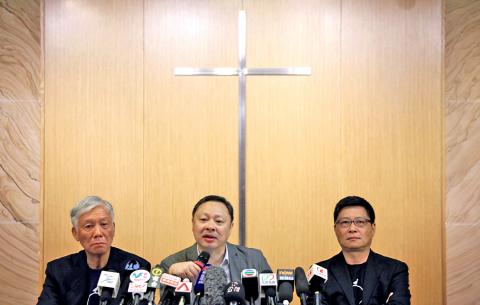Organizers yesterday urged Hong Kong’s government to take seriously an unofficial referendum on democratic reform after nearly 800,000 people voted in the territory, but state media in Beijing dismissed the ballot as unpatriotic.
The poll organized by pro-democracy activists that closed late on Sunday saw more than 780,000 people voting on how Hong Kong’s next leader should be chosen, days before a planned massive protest for greater democracy in the territory.
About 88 percent urged the territory’s lawmakers to veto any political reforms that do not meet “international standards.”

Photo: Reuters
The number of voters represents almost a quarter of the 3.47 million registered voters in 2012.
“The Hong Kong government should take seriously the views of nearly 800,000 citizens,” referendum organizer Benny Tai (戴耀廷) told a radio program yesterday.
The ballot was organized by a group called Occupy Central, which threatens a mass sit-in in the Central district later this year unless authorities come up with acceptable electoral reforms.
Chinese state media slammed the referendum as unpatriotic and driven by “political paranoia,” while the territory’s government said it “respected” people’s views.
“The basic political requirement for Hong Kong’s chief executive is that they must love both the country and Hong Kong. The opposition has refused to accept this requirement,” the Global Times said in an editorial.
“Some people have become frenzied. They seem civilized and rational, but their political paranoia is about to light a fuse,” the editorial added.
The China Daily called the poll an “unconstitutional political charade” and accused the US of funding its organizers.
Beijing has promised to let Hong Kong residents elect their next chief executive in 2017, but has ruled out giving voters a say in selecting candidates.
The winning proposal, offered by the Alliance for True Democracy, would allow the public or democratically elected lawmakers to nominate candidates.
Organizers of today’s rally and march, marking the July 1 anniversary of the transfer of sovereignty, expect it to be the largest since the handover with at least 500,000 people expected.

The US government has signed defense cooperation agreements with Japan and the Philippines to boost the deterrence capabilities of countries in the first island chain, a report by the National Security Bureau (NSB) showed. The main countries on the first island chain include the two nations and Taiwan. The bureau is to present the report at a meeting of the legislature’s Foreign Affairs and National Defense Committee tomorrow. The US military has deployed Typhon missile systems to Japan’s Yamaguchi Prefecture and Zambales province in the Philippines during their joint military exercises. It has also installed NMESIS anti-ship systems in Japan’s Okinawa

‘WIN-WIN’: The Philippines, and central and eastern European countries are important potential drone cooperation partners, Minister of Foreign Affairs Lin Chia-lung said Minister of Foreign Affairs Lin Chia-lung (林佳龍) in an interview published yesterday confirmed that there are joint ventures between Taiwan and Poland in the drone industry. Lin made the remark in an exclusive interview with the Chinese-language Liberty Times (the Taipei Times’ sister paper). The government-backed Taiwan Excellence Drone International Business Opportunities Alliance and the Polish Chamber of Unmanned Systems on Wednesday last week signed a memorandum of understanding in Poland to develop a “non-China” supply chain for drones and work together on key technologies. Asked if Taiwan prioritized Poland among central and eastern European countries in drone collaboration, Lin

BACK TO WORK? Prosecutors said they are considering filing an appeal, while the Hsinchu City Government said it has applied for Ann Kao’s reinstatement as mayor The High Court yesterday found suspended Hsinchu mayor Ann Kao (高虹安) not guilty of embezzling assistant fees, reducing her sentence to six months in prison commutable to a fine from seven years and four months. The verdict acquitted Kao of the corruption charge, but found her guilty of causing a public official to commit document forgery. The High Prosecutors’ Office said it is reviewing the ruling and considering whether to file an appeal. The Taipei District Court in July last year sentenced Kao to seven years and four months in prison, along with a four-year deprivation of civil rights, for contravening the Anti-Corruption

NO CONFIDENCE MOTION? The premier said that being toppled by the legislature for defending the Constitution would be a democratic badge of honor for him Premier Cho Jung-tai (卓榮泰) yesterday announced that the Cabinet would not countersign the amendments to the local revenue-sharing law passed by the Legislative Yuan last month. Cho said the decision not to countersign the amendments to the Act Governing the Allocation of Government Revenues and Expenditures (財政收支劃分法) was made in accordance with the Constitution. “The decision aims to safeguard our Constitution,” he said. The Constitution stipulates the president shall, in accordance with law, promulgate laws and issue mandates with the countersignature of the head of the Executive Yuan, or with the countersignatures of both the head of the Executive Yuan and ministers or